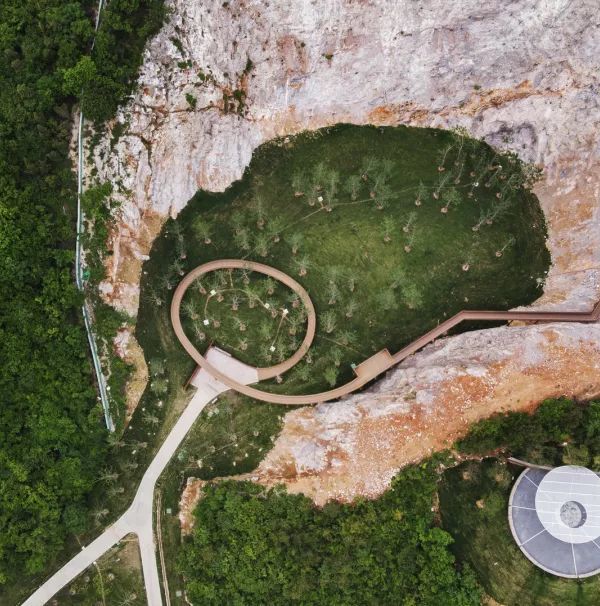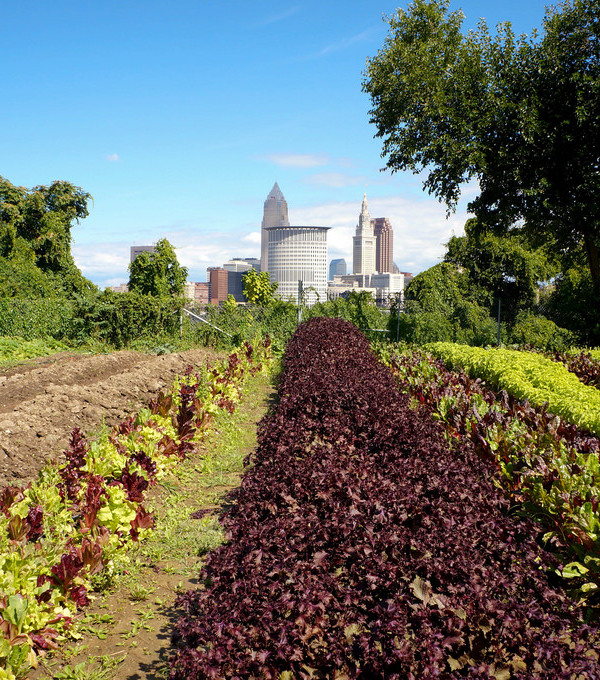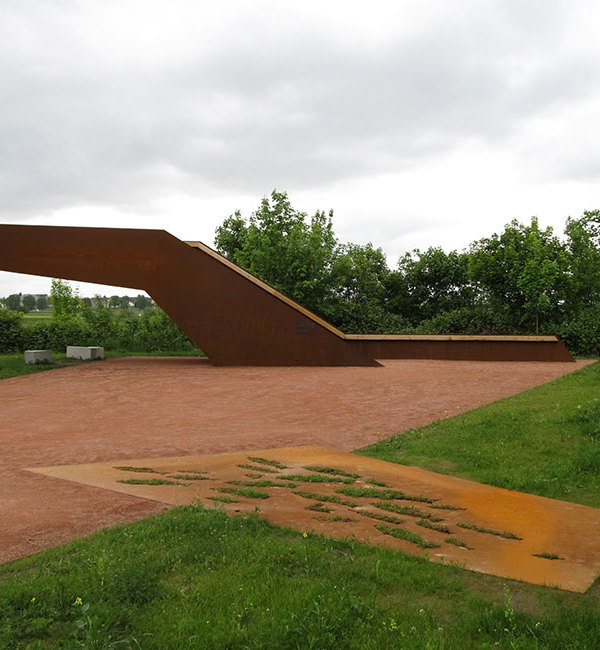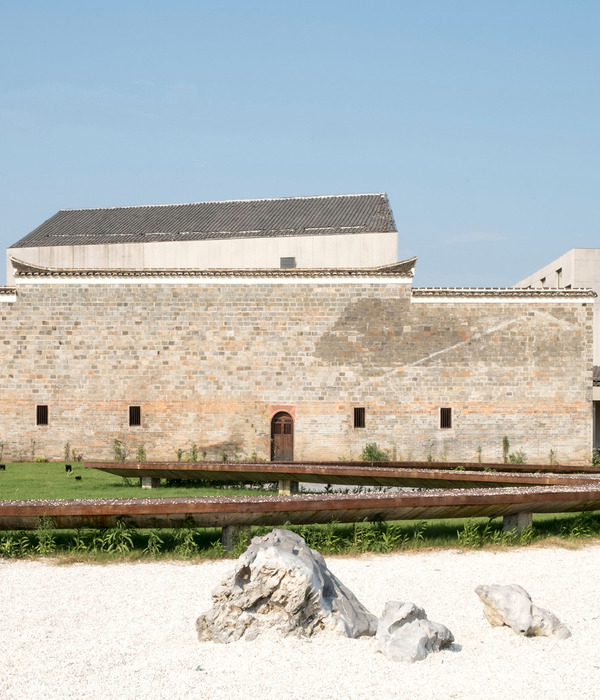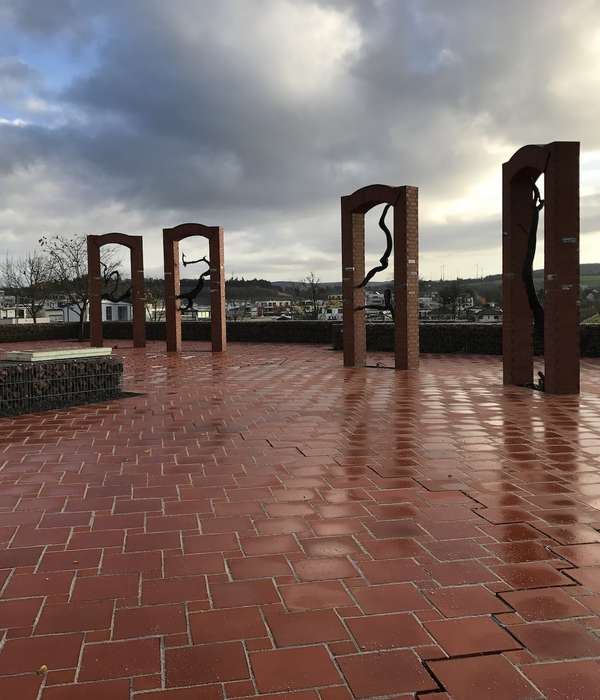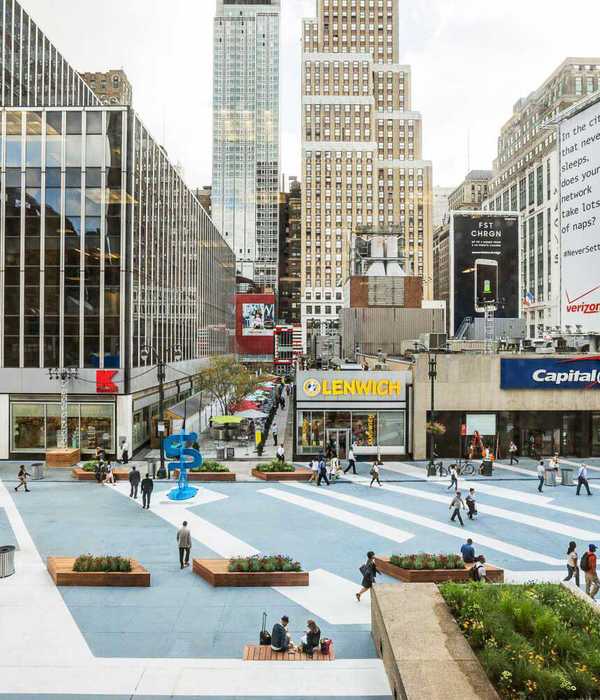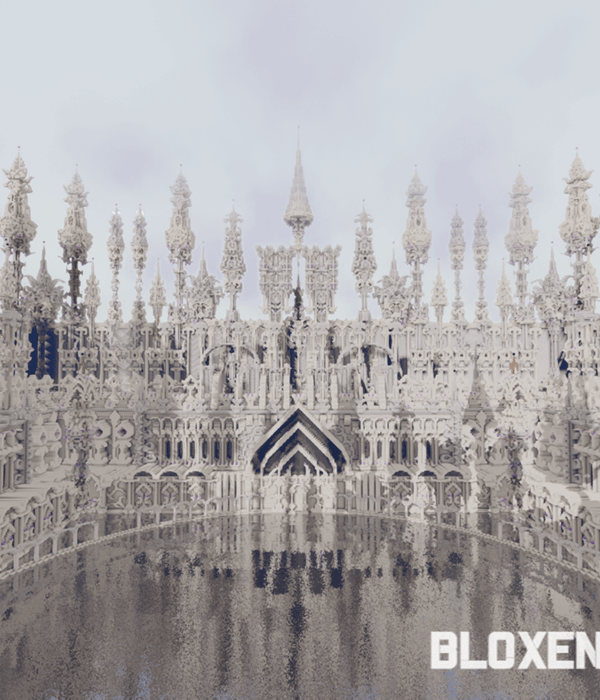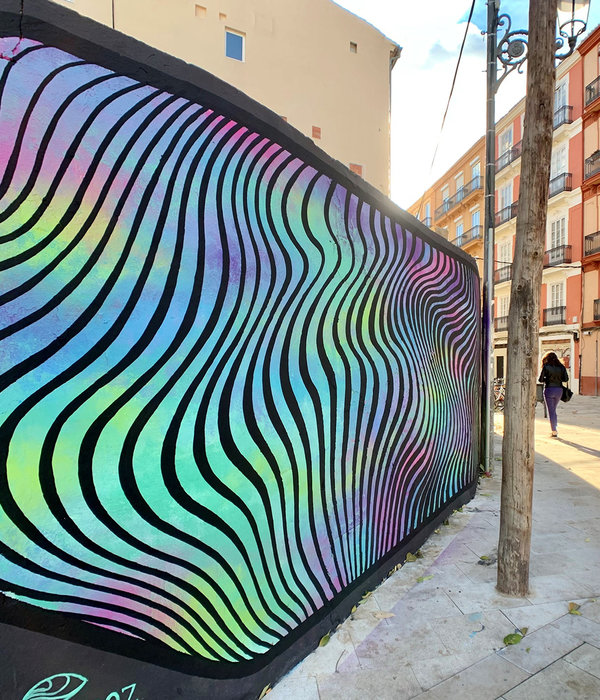- 项目名称:杭金衢高速兰溪收费站周边(南入城口)及兰溪市迎宾大道景观改造设计
- 设计方:上海太禾城市设计咨询有限公司
- 基地面积:171公顷
- 摄影版权:章鱼见筑,太禾设计
- 客户:兰溪市市政工程管理处
- 品牌:乌桕,无患子,栾树,竹子
你走,因为你膧憬外面的世界。你回,因为你心中倦恋。送别,迎接,在这茶亭里,竹林边。
You go, because you think about the outside world. You back, for your heart is weary with love. Farewell, to meet, in the teahouse, bamboo forest edge.
▼高速口鸟瞰图,aerial view ©太禾设计
浙江杭金衢高速兰溪入口及迎宾大道(横山大桥-杭金衢入口段)位于兰溪市南部,北接横山大桥,直通兰溪主城区。改造前兰溪南入城口缺少标志,周边是废弃的农田,污水汇集,杂草从生。交叉口按公路标准建设,路口很宽,没有红绿灯,安全和行驶秩序存在隐患。迎宾大道部分道路两侧是大片的树林和小规模池塘,部分道路两侧则是简陋的民宅。杭金渠高速高架桥上挂满简陋艳俗的户外广告,无识别性无标志性。
Lanxi Entrance of Zhejiang Hangjinqu Expressway and Yingbin Avenue (Hengshan Bridge – Hangjinqu Entrance Section) are located in the south of Lanxi City, north of Hengshan Bridge, straight to the main urban area of Lanxi. Before the reconstruction, the south entrance of Lanxi lacked signs, surrounded by abandoned farmland, sewage collection, weeds from the unripe. The intersection is built according to highway standards, and the intersection is wide with no traffic lights and hidden dangers of safety and driving order. Part of Yingbin Avenue is flanked by large woods and small ponds, while part of the road is flanked by humble houses. Hangjinqu Expressway Viaduct covered with simple and gaudy outdoor advertising, there is no identification and no sign.
▼总平面图,general plan ©太禾设计
项目通过完善道路规划,增添城市文化特色以及景观改造提升后,在浙江省2017年“四边三化”“双百”创建考评验收中,分别通过省级精品道路、省级精品入城口验收,其中迎宾大道入选2017年省级精品示范道路。
After improving the road planning,adding urban cultural characteristics and upgrading the landscape, the project passed the provincial quality road and provincial quality entrance acceptance respectively in the 2017 Zhejiang Province “Four sides, Three modernizations” and “Double hundred” creation evaluation and acceptance, among which Yingbin Avenue was selected as the 2017 provincial quality demonstration road.
▼迎宾大道鸟瞰图,aerial view ©太禾设计
▼道路两侧的民房,private houses along the road © 章鱼见筑
将现有资源和场地功能科学结合,合理运用,用最少的成本,最低的影响,呈现最优的景观效果和可持续发展年限。
Scientific combination of existing resources and site functions, rational use, with the least cost, the lowest impact, to present the best landscape effect and sustainable development years.
▼兰湖大道入口,entrance to Langhu Avenue ©章鱼见筑
▼湿地公园,wetland park ©太禾设计
遵循道路设计规范,提升道路通行质量,保证通行安全,考虑车行观景体验
Follow the road design specifications, improve the quality of road traffic, ensure traffic safety, consider the viewing experience of the car shop.
▼优化后交通,optimized traffic ©太禾设计
强化兰溪的风土人情,提高城市的形象品牌,增强城市的文化魅力内涵。在杭金衢高速兰溪入口处利用地形设计了茶园。借鉴梯田的种植形式,种植每垄宽1.5米的茶树,并采用专门的机器采摘茶叶,既产生了经济效应也凸显了大地景观的观赏价值。并在其余的道路转角处设置绿地,增加兰溪标识,强化门户形象。
Strengthen the local conditions and customs of Lanxi, improve the image and brand of the city, and enhance the connotation of the city’s cultural charm. The tea garden is designed at the entrance of Lanxi River in Hangjinqu Expressway. Drawing on the planting form of terraced fields, tea trees with a width of 1.5 meters are planted in each row, and special machines are used to pick tea leaves, which not only produces economic effect but also highlights the ornamental value of the landscape. And in the rest of the road corner set up green space, increase Lanxi logo, strengthen the image of the portal.
▼指纹茶园,fingerprint tea garden ©太禾设计
在高速下口的街角绿地上设计了兰溪字样的雕塑,作为进入兰溪的标志,以竹林作为背景,烘托归家与远行的空间氛围。对原有道路进行更改转弯半径,增加交通信号灯后,道路尺度缩小了,同时加快了通行速度,提高了行车秩序和安全指数。桥下道路是通往金华方向和进入兰溪的迎宾大道,利用现状高架桥的结构基础,用柔性质感涂料在桥身上通过色彩勾勒出传统的牌楼形式,并悬挂兰溪和金华字样,以最少的成本,形成最明显的出入兰溪标识,同时避开了高速路建设的管理权限,人们称之为智慧门。
On the green space at the corner of the exit of the highway, a sculpture of the word “Lanxi” is designed as a sign to enter Lanxi. With bamboo forest as the background, the space atmosphere of returning home and traveling away is set off. After changing the turning radius of the original road and adding traffic signal lights, the road scale is reduced, the traffic speed is accelerated at the same time, and the driving order and safety index are improved. Bridge road is the gateway to the jinhua direction and enter the lanxi yingbin avenue, utilization of viaduct structure foundation, with flexible texture coating on the bridge by colour draws the outline of the ornamental archway of the traditional form, and hung lanxi and jinhua, with minimal cost, formed the most obvious discrepancy lanxi logo, at the same time avoid the administrative authority of highway construction, people call it the wisdom door.
▼入城口形象,entrance image ©太禾设计
将现状靠近路口的水面扩大,使得停在红绿灯路口的车辆行人都能看到湖面,仿佛将兰湖的风景延伸到迎宾大道。迎宾大道两侧有若干个现状沟渠池塘,选取行知学院边上的河道,扩大水面,整理成两块路边湿地公园,平时灌溉养殖,洪水时可蓄洪。保留原始的树木形成半岛,本来不大的河道建成后层次丰富,树岛层层叠叠,看不到水的来龙去脉,似乎非常深远。
Expand the current water surface near the intersection, so that all the vehicles and pedestrians parked at the traffic light intersection can see the lake, as if extending the landscape of Lan Lake to Yingbin Avenue. There are several current ditches and ponds on both sides of Yingbin Avenue. The river near Xingzhi College is selected to enlarge the water surface and arrange into two roadside wetland parks, which can be irrigated and bred in ordinary times and stored in floods. Preserve the original trees to form the peninsula, originally small river built after rich levels, tree island layer upon layer, can not see the origin and development of the water, seems to be very far-reaching.
▼竹林屏障,bamboo barrier ©太禾设计
在迎宾大道隔离带中种植乌桕、无患子、栾树,竹子,均为长势良好的乡土树种,并且价格便宜。秋天乌桕渐黄,为迎宾大道增添了秋日的独特风景线。竹林密布,屏蔽了原先杂乱的沿街立面。
Planting tallow, koelreuteria paniculata, koelreuteria paniculata and bamboo in the isolation zone of Yingbin Avenue are all native species with good growth and low price. Autumn tallow trees turn yellow, adding a unique autumn scenery to the Welcome Avenue. Bamboo groves screen the previously rambling facade along the street.
▼春天的乌桕,tallow in Spring ©太禾设计
▼秋天的乌桕,tallow in Autumn ©太禾设计
绿道选择了明快浪漫而不失典雅的的酒红色,并设计了两种纹样,一种是舒展飘逸富有动感韵律的白色细线,一种是从当地婺剧脸谱中提取的元素,经抽象艺术处理成彩色色块。
The greenway chooses the bright, romantic and elegant wine red color, and designs two kinds of patterns: one is the white thin line with flowing and dynamic rhythm, the other is the elements extracted from the facial masks of local Wuju operas and processed into color blocks by abstract art.
▼林中绿道,the greenway ©太禾设计
▼从当地婺剧脸谱中提取的纹样 patterns extracted from the facial masks of local Wuju operas ©太禾设计
兰亭:BRT公交站以繁体兰字为原型的,应用醒目的黄色。兰灯:路灯外观造型来自于兰花,整体色调为深灰色,白天融入行道树的荫影里,晚上伴着灯光呈现优雅形态,可以同时照亮车行道和非机动车道。
Orchid Pavilion: BRT bus station to traditional Chinese character as the prototype, the application of eye-catching yellow. Orchid lamp: The appearance of the street lamp is derived from orchids. The overall tone is dark gray. In the daytime, the street lamp is integrated into the shadow of the street trees.
▼兰亭 – 蘭字造型的BRT车站 Orchid Pavilion – a BRT station in the shape of orchid characters ©太禾设计
▼兰灯 – 路灯,Orchid lamp – street lamp ©太禾设计
利用本地的黄泥沙子和石灰做成夯土墙,在墙顶盖上一块钢板,铺上小青瓦。夯土墙面上用镂空钢板并刻上新周村的名号,为增添夜景效果,还在墙边缘装上了LED灯带。
The rammed earth wall is made of local yellow mud sand and lime, and a steel plate is covered on the top of the wall and small green tiles are laid. Hollow steel plates are used on the rammed earth walls and the name of Xinzhou Village is engraved on them. LED light strips are also installed on the wall edges to add the night scene effect.
▼夯土墙村标,village logo with rammed earth wall ©章鱼见筑
公厕采用了兰溪当地传统天井屋的形式,白墙黛瓦,还有一个传统形式的精雕细刻的入口门头。建筑中间设计了一个种满芳香植物的院子,三片坡向院子的单坡瓦屋顶,可以将雨水收集后储存在厕所的水池中,用来冲洗厕所。
The public toilet is in the form of a traditional patio house in Lanxi, with white walls and black tiles, and a traditional carved entrance door. In the middle of the building is a courtyard filled with fragrant plants, with three sloping roofs, which collect rainwater and store it in the sink of the toilet for flushing.
▼天井屋公厕,public toilets ©章鱼见筑
▼天井屋公厕立面图,elevation of the public toilets ©太禾设计
▼夯土墙村标立面图,elevation of the Village logo with rammed earth wall ©太禾设计
{{item.text_origin}}


